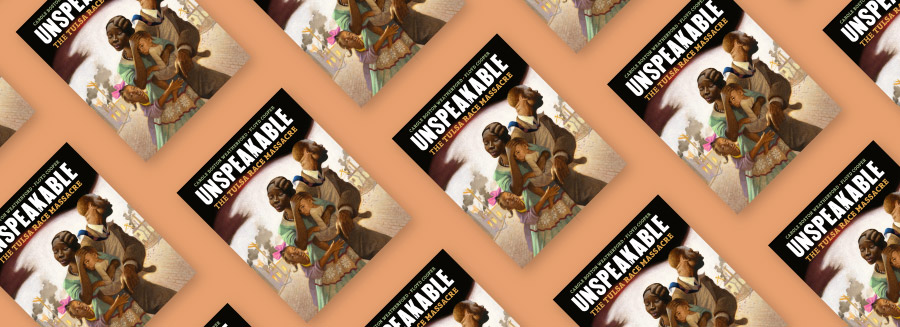
In the seventh part of our Complex Books, In Context series, I’m “zooming out” on Unspeakable: The Tulsa Race Massacre, written by Carol Boston Weatherford and illustrated by Floyd Cooper.
In this post, I am using Unspeakable as an example of an anchor text for an inquiry unit for secondary students that explores social justice themes. (Consider this your daily reminder that picture books make excellent shared experiences to kick off complex conversations with students OF ANY AGE!) I started with an essential question. Then, as a way to braid Social Justice Standards with academic standards, I identified the SJ standards that are aligned with the themes of the text. And finally, I curated additional resources for students to explore as a part of a self-guided inquiry into these themes.
Essential Question:
How do injustices of the past still affect us today?
Anchor Text:
Unspeakable: The Tulsa Race Massacre
Theme #1: Culture
Unspeakable offers historical context for the formation of black communities, both geographically and culturally. Segregation laws meant that black communities were forced to provide all basic needs for each other and live independently of neighboring white communities. In many towns and cities all over the country, this segregation resulted in the development of rich cultures and communities.
Identity 1.
Students will develop language and historical and cultural knowledge that affirm and accurately describe their membership in multiple identity groups.
Texts for Students to Explore
- The Long-Lasting Legacy of the Great Migration (article)
- How the Harlem Renaissance helped forge a new sense of Black identity (article)
Theme #2: Pride and Identity
The story of Greenwood’s success before the massacre creates an opportunity for students, specifically those identifying as a part of the Black American community, to feel pride. There are many examples of similarly successful black communities across the country that were thwarted by violence and theft, often by white government officials and law enforcement.
Identity 4.
Students will express pride, confidence and healthy self-esteem without denying the value and dignity of other people.
Texts for Students to Explore
- What the Tulsa Race Massacre Destroyed (interactive webpage)
- Beyond Tulsa: The Historic Legacies and Overlooked Stories of America’s ‘Black Wall Streets’ (video)
Theme #3: Diversity in Context
When we are more familiar with our history (e.g., racial segregation), we develop a deeper understanding of the need to be intentional about diversity and equity. Unspeakable helps set the stage for a conversation about why we need to pay specific attention to the unique needs of historically marginalized groups.
Diversity 10.
Students will examine diversity in social, cultural, political and historical contexts rather than in ways that are superficial or oversimplified.
Texts for Students to Explore
Theme #4: Institutional Discrimination
In the massacre and the events leading up to it, we can see both individual racism (e.g., white community members attacked black citizens) and institutional racism (e.g., the newspapers incited violence, the police officers condoned the riots and murders, and the citizens were never compensated for their losses). Pulling out these examples allows students to conceptualize the difference between individual and institutional discrimination and their impacts.
Justice 12.
Students will recognize unfairness on the individual level (e.g., biased speech) and injustice at the institutional or systemic level (e.g., discrimination).
Texts for Students to Explore
- Institutional racism | Definition, Meaning, & Examples | Britannica (encyclopedia)
- Racial/Ethnic Prejudice & Discrimination: Crash Course Sociology #35 (video)
Theme #5: Impacts of Past Injustice
The massacre had long lasting impacts on the black citizens, the city as a whole, and subsequent generations. Unspeakable can help jumpstart a broader conversation about the long-term impacts of injustice. These problems don’t resolve themselves within one generation. Impacts are still being felt today.
Justice 13.
Students will analyze the harmful impact of bias and injustice on the world, historically and today.
Texts for Students to Explore
Theme #6: Power in Society
It took 75 years before the Tulsa race massacre was even investigated, and no family has ever been compensated for their losses. This tells us an important story about how racial power dynamics operate in the U.S. Some tragedies get national attention and we “never forget.” Some are ignored and intentionally hidden. It depends on who holds the power to demand that attention.
Justice 14.
Students will recognize that power and privilege influence relationships on interpersonal, intergroup and institutional levels and consider how they have been affected by those dynamics.
Texts for Students to Explore
Theme #7: Collective Action
Students can research ways to get involved in the fight for racial justice and plan collective action in their communities. Unspeakable is a great jumping off point to talk about the history of segregation and/or racial violence in your own community.
Action 20.
Students will plan and carry out collective action against bias and injustice in the world and will evaluate what strategies are most effective.
Texts for Students to Explore
- Equal Justice Initiative: Get Involved (resources)
- Separate and Unequal: Racial and Ethnic Segregation and the Case for School Funding Reparations in New Jersey (article)
* This is an example from New Jersey. You’ll want to find a resource about your local community for your students to explore.
Remember that the intention of “zooming out”/inquiry is for students to go beyond the anchor text and immerse themselves in exploration. The resources I’ve provided here are examples of how you can give students opportunities to take an essential question and expand their view beyond the core text/topic, ultimately asking and answering their own questions. This self-guided inquiry opens doors for deep engagement and sparks curiosity. If you are interested in learning more about how Mackin Learning can support your team of educators in using inquiry-based learning, please reach out!
Check out the other guides in this series for Wonder, Genesis Begins Again, The 57 Bus, Jacob’s New Dress, Dreamers, and Milo Imagines the World.






